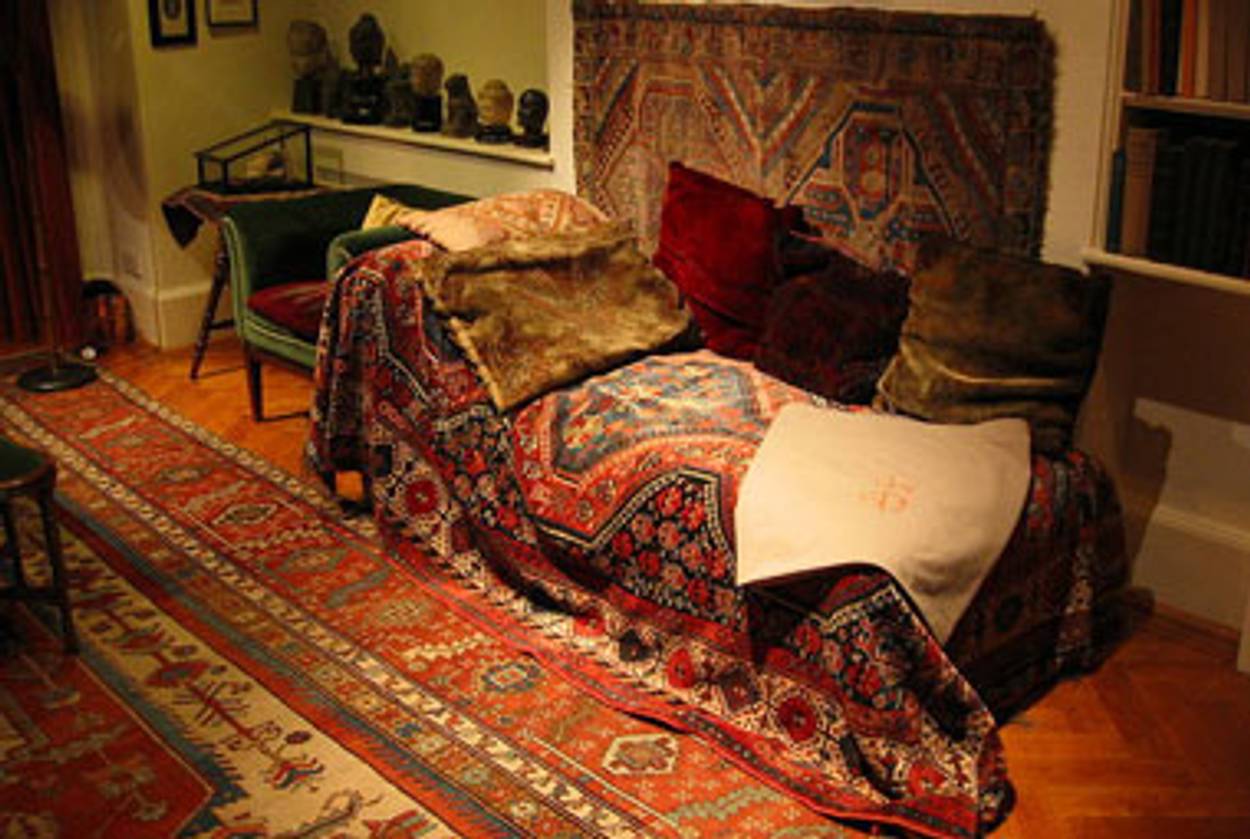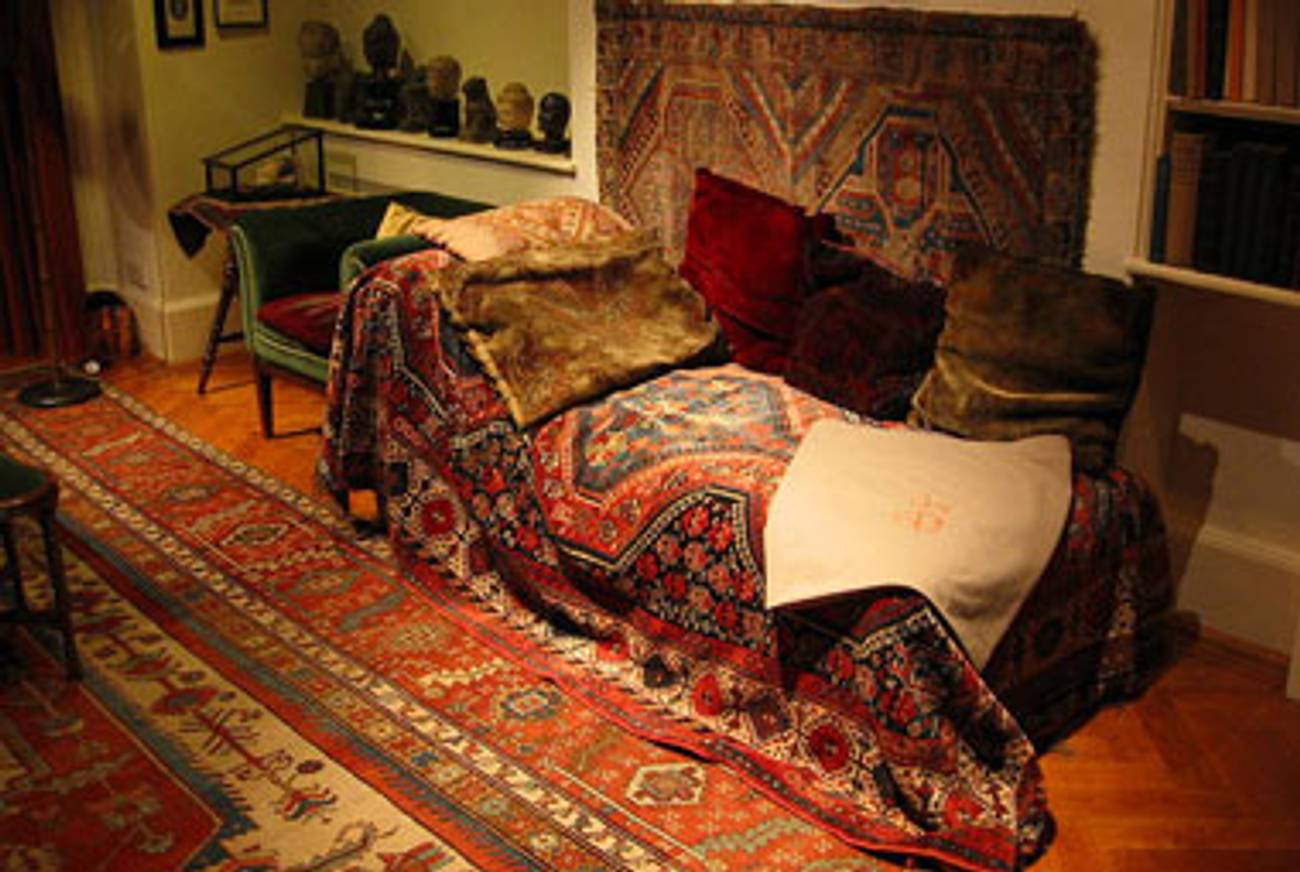Shock Therapy
How my shrink helped me by becoming my biggest problem




The panic probably came on slowly, but, as one fails to notice the gradual death of a light bulb, I somehow missed its approach. By early last fall, I found myself in a state of acute anxiety in which everything in my life—from my friendships to my magazine subscriptions to the city I live in—became subject to relentless questioning. Of the various irritants, though, none was perhaps as troubling as the growing ambivalence I felt about working for a Jewish publication.
I had, typically, a strong proclivity toward both the observational thrills of reporting and the introspective opportunities afforded in covering the Jewish world, as well as obsessions with religion and cheesy pop culture (with which the Jewish world abounds), not to mention writing. I had until that point been relishing the looming opportunity to muck around in even more puddles of Jewish culture, with Tablet still in its pre-nascent stages. But all the news about the economy tanking and the impending death of Journalism had put a pressure on me I had yet to experience in my adult life—now, I was supposed to feel lucky just to have a job. Talk about a kein ayin hora. Suddenly, it seemed that my work was tightening around me, posing a threat to a large part of my identity: the unique role I played as a rebel and incorrigible seeker of exotic experiences as the child of an eighth-generation rabbi father and Jewish communal worker mother.
I decided to look for a therapist, guided by little more than my insurance company’s website and the vague idea that I wanted to see someone Jewish and female. I still can’t quite say whether this preference stemmed from a desire for someone who would mirror myself and provide comfort in a similar manner to my mother, some vestigial “insider” impulse, or was simply the least restrictive qualification I could apply, given the demographics of the New York City therapeutic community. As it turned out, my tenure as the patient of a woman I’ll call Sharon Stein helped enormously, but not for the reasons I, or anyone else, could have predicted.
****
Sharon is in her mid-60s and exudes the graceful toughness that I associate with a certain kind of Jewish woman. Her large features and skeptically-set mouth reminded me of an Ashkenazic version of my beloved late grandmother. As soon as I met her, I felt a familiar, if constricting, kinship. I immediately began to question my decision. Did I really need another mother, or aunt? Would she be able to understand my complicated relationship to my Jewishness?
But I found that what felt “Jewish” about her, at least initially, also felt good. Her specific brand of dark humor and matter-of-fact assessments seemed neutral and comforting, and I liked that she acknowledged ideas that had become taboo among women my age: that romantic longing sometimes drives us, that we want babies, and that we get irrationally angry when we feel like other people have what we, too, are due. Her folksy way of commiserating with my endless frustrations—“most people are schmucks,” “you’ve gotta have the chutzpah to decide who the people you want in your life are,” “there’s no point trying to relate to people who haven’t suffered”—just about balanced some of her more cringe-inducing self-help platitudes. She didn’t judge me for my obsession with omens, or my superstitious attachment to certain jewelry, but did take strong issue with my laziness and self-pity. I settled into a pattern of talking around the subject of my work. I slowly began to trust her, and to appreciate the symmetry in talking to someone who relied on Jewishness as a code, and obviously shared some of my familial neuroses, but seemed somehow immune to their crippling effects. A functional nut! Maybe I could be one too.
One day at work, though, four or five sessions into my time with Sharon, my issues with Jewish organizational life reached a fever pitch. I had a pathological desire to turn and run from the Jewish world, from the realm of neurotic writers, and from New York City, into the Wild West of the mind: California, working with kids, driving through mountains, freedom from Yiddish puns, arguments about Israel—even bagels had become sinister. Even in the heat of this anxiety, I knew I was conflating my job and my family and my personality and my fate, and perceiving an inappropriately grandiose narrative where there was just a quiet indie drama—but still, I was losing my grip.
Once in Sharon’s office, I took a deep breath and began describing my mounting desire to flee, heightened by the sense that, career-wise, I had gotten something I wanted but paid too dearly for it. I weepingly confessed that I was finding the focus on my people—our people—too parochial, and that I sometimes looked down on family members who had narrowed their professional worlds in this way. Without thinking, I offered frantic caveats—that many of my best friends were Jewish, that I love the holidays, that all else being equal, I would prefer to marry a Jew—none of which changed the fact that, at the moment, I would have given anything to be able to turn my back on the whole thing.
As I talked, Sharon’s face, peering out from that day’s scarf-brooch combo, went from expressing patient curiosity to amused condescension. When I paused for air, she jumped in. She explained that she too had struggled with her Judaism when she was younger, had dabbled in Buddhism and eventually came back to all the “wonderful” things about our faith. I sputtered that it wasn’t an issue of my personal Judaism, but of my work and my role in my family and my feeling that I was a fraud among the East Coast Jewish intelligentsia. She countered by telling me about how she had once attended a lecture about Judaism and the law and how it had gotten her more interested in the religion—maybe I should try something like that? Maybe I could write about klezmer music’s effect on other musical forms? Had I considered the idea of taking pride in being Jewish because “so many of us are so bright”?
At this point, I gave up trying to respond, but the coup de grace was still to come. Unbidden, Sharon launched into a story about how she had reluctantly joined a Torah study group at her Reform synagogue. At first, she explained, she was concerned that it wouldn’t be intellectual enough, but—through pluck and determination—she was able to bring her own perspective to the group, which then took everyone in an unexpected and “fascinating” direction. As she reached the triumphant climax of this tale of personal discovery, I glanced at the clock and realized we—she—had gone almost 10 minutes over our allotted time. I gathered my things, stood up and thanked her. Same time next week?
A few days later, I called Sharon’s receptionist and cancelled my next appointment. I never went back.
Over the next few months, I parsed the experience on my own. I had gone to Sharon looking for, at best, a way into understanding and, at least, an escape. Instead, what I got was a brochure. Just like my mother, just like my aunts—like me, even, in some ways—Sharon was incapable of impartiality when it came to the question of a young Jew questioning her place in the tribe. Instead, as I was drowning under the pressure to put a lens of pride on all things Jewish, she presented me with a surreal example of precisely what was making me feel suffocated in the first place.
But, like my grandmother used to say, God writes with a crooked hand. Sharon’s performance turned out to be a comically apt manifestation of the elusive thing I had been bothered by—the “pride blinders” that otherwise thoughtful people develop when conversations turn to Jewishness. And in hindsight, she provided me with a ripe Jewish story of my own—tricking me, in a way, back into engagement with this topic that had become so fraught. As my generalized anxiety waned, I woke up to my natural state of curiosity. Just as Judd Apatow could probably make a hilarious movie exploring the lives of professional golfers, and J.D. Salinger could likely write an intriguing novel from the perspective of a poor octogenarian (well, maybe he has), even the less talented among us have any number of paths we can go, but often function best within a certain realm. Maybe Jewishness won’t be mine forever, but Sharon helped me remember where my interest in the topic lay: myself.
Hadara Graubart was formerly a writer and editor for Tablet Magazine.
Hadara Graubart was formerly a writer and editor for Tablet Magazine.